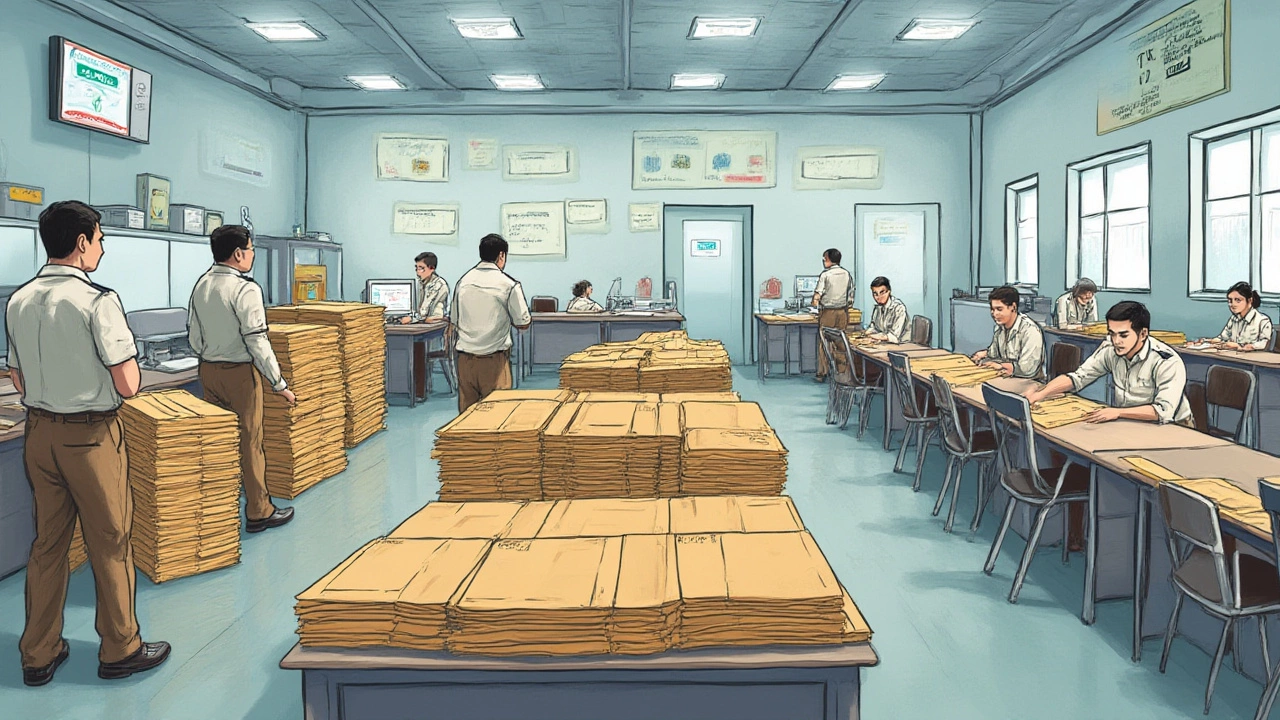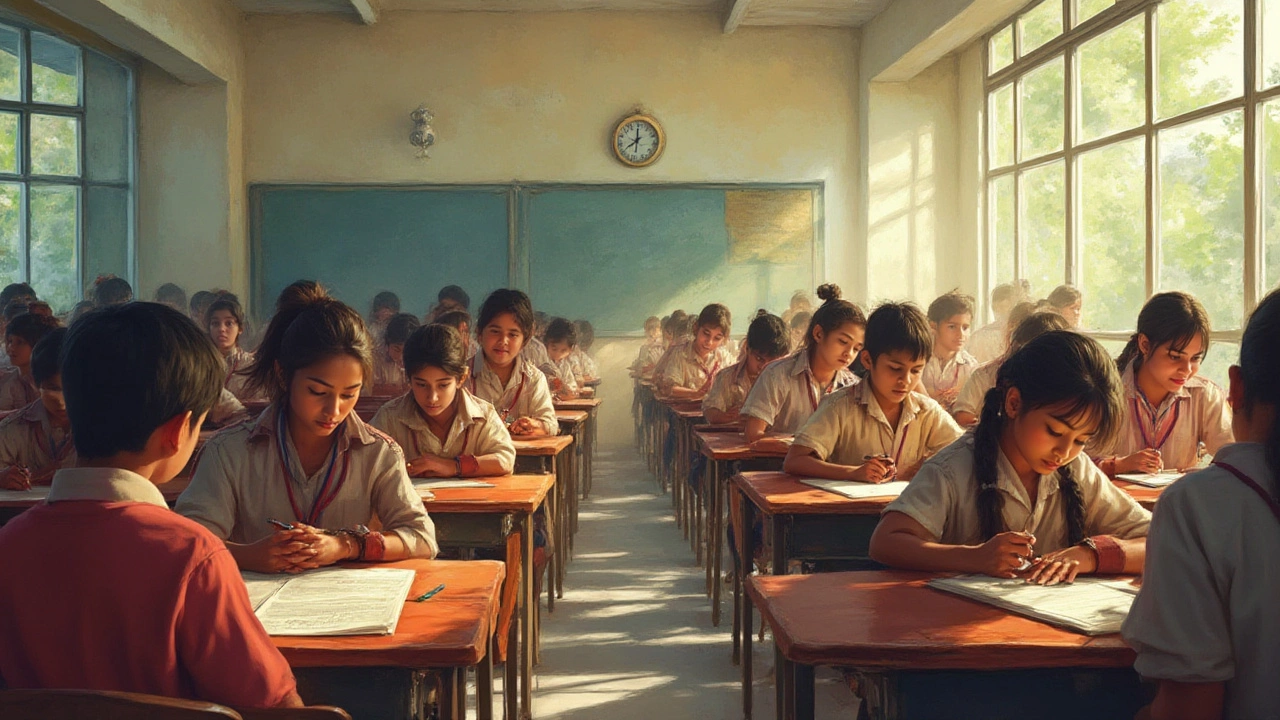Picture this: a teenager in Mumbai, another in Shillong, and a third in some remote corner of Rajasthan—each hunched over an exam desk, pencil poised, staring down at the same question paper at the exact same time. Is that how it really works? Or are there secret variations to CBSE board exams that no one talks about? Rumors float on WhatsApp groups, anxious parents whisper in school corridors, and every year, someone claims a cousin in another state had it tougher. Time to clear the air and get into the nitty-gritty of whether the Central Board of Secondary Education (CBSE) papers—especially for Class 10 and 12—are truly identical across India, or if there’s more happening behind the scenes.
How the CBSE Exam System Is Set Up
CBSE is massive. Try to imagine 27,000+ schools nationwide, plus 240 in other countries, all running according to the same curriculum. Every March, millions of students sit for CBSE board examinations. The process of setting these exams isn’t just about tossing some questions together. First, teams of experienced teachers (they’re called paper setters) are put together—often subject teachers from top-performing schools. Their job is to draft question papers based tightly on the CBSE syllabus, aiming for a fair spread between easy, moderate, and tough questions.
Now, here’s the detail people often miss: once paper setters make the draft, their version goes to moderators. These folks tweak questions for clarity, remove errors, and check if anything’s too far outside the syllabus (so you don’t get blindsided by that one chapter everyone thought was optional). Only then does the CBSE finalize the set. Security gets super strict next: papers are printed under surveillance in high-security presses. Think: vault-style doors, CCTV everywhere, and guards who take their jobs way too seriously. These papers are then sealed and shipped to exam centers under super tight security.
For anyone keeping score, this all means the process is about as centralized as it gets. The big goal? Level the playing field so a kid in a Delhi private school and one in a government school in Ladakh face the exact same questions. CBSE’s official announcements, circulars, and even the annual press conference by the board chair always repeat: papers are identical all over India. There’s no regional version, no language or state discretion about which questions get asked—as long as you’re writing your exam in English or Hindi (or a few select regional languages the board approves).
Are CBSE Question Papers Actually the Same Nationwide?
Here’s where the plot thickens. Every year, someone swears their cousin in Kerala saw different questions. The reality? The CBSE strictly maintains that it gives the same set of question papers for each subject, for each date throughout India—and even for affiliated schools abroad. That’s the rule. But, sometimes, “set” means a little more than you’d think.
To outsmart cheaters, CBSE introduced multiple paper “sets”—often three, labeled Set 1, Set 2, and Set 3. Each set has the same type, number, and difficulty level of questions, just shuffled or reworded. You might have “Question 5” as a physics problem about light in Set 1, but in Set 3, it appears as “Question 12.” It’s the same stuff, just in a scrambled order so that copying becomes pointless. This rotation is random and assigned right before exams at test centers. The official answer keys for all sets are exactly equivalent, so there’s no advantage to any variation.
Looking at statistics: for the 2024 CBSE Class 12 exams, more than 1.6 million candidates got one of three shuffled versions of the paper for nearly every major subject. The content, though, remained identical at its core. Spot checks and national media coverage have found no substantial evidence of different sets in different states. That said, for foreign CBSE schools (think Dubai or Singapore), the timing might shift for time zones, but papers themselves still match.
So, if your friend in Chennai is sweating over the same chemistry diagram that stumped you in Kolkata, you can be sure you’re fighting the same battle. If a rare leak or last-minute paper replacement happens (as it did during infamous 2018 Class 12 Economics paper leak), CBSE issues a new version to all centers affected, not just one region. That’s why you hear every now and then about students unexpectedly getting a different paper—always in emergency circumstances, not standard policy.

Why Secrets and Myths About CBSE Paper Variation Keep Spreading
Ever wondered why so many students (and sometimes even teachers) swear CBSE papers are easier or harder somewhere else? A few things fuel these myths. First, different sets can look different if you only see one paper. Second, kids like to believe the grass is greener—or the math is easier—on the other side. And finally, poorly informed social media posts blast out news of “different” papers without showing the actual questions for comparison.
One thing students often forget is subjectivity. What’s tough for one might be a breeze for another. A biology topper in Bangalore might find the same paper simple, while a literature lover in Rajasthan calls it “brutal.” That subjective take snowballs when you throw in online chats, “memory-based” question leaks, and classroom gossip. Data shows exam difficulty scores—those are the percentage of students who got each question right—are almost perfectly even across geographic regions for the CBSE board. In a 2023 analysis published by an education data startup, the question accuracy spread between urban and rural schools for Class 10 Maths was under 2%.
Then there’s the matter of languages. CBSE allows major exams to be written in English, Hindi, and, in some subjects, other Indian languages. The translation is handled very, very carefully. The important bit? Every translated version is based strictly on the same original, and a special team cross-checks that no one’s paper is “easier” because of how a phrase was translated. Mistakes do happen in phrasing, but schools can report these and get clarifications (it’s rare though). It’s really tough for variations to creep in big enough to matter.
That said, some practical issues crop up. An exam held in one state could be rescheduled because of a local holiday or public emergency. In those cases, students might face a replacement “special” paper prepared by CBSE at the last minute. These replacement versions are drawn from the same question bank and set at an identical standard. Rumors usually start when people compare the regular exam set and this backup version. But in terms of content and level, the CBSE’s guidelines make sure nobody’s paper is easier or harder—at least, not on purpose!
Tips for CBSE Exam Preparation: What Actually Matters
If you’re staring down your next CBSE board, don’t waste a second stressing about which paper set you’ll get. Focus on what you can actually control. Here’s a battle-tested plan that works for students across India, regardless of region, language, or paper set.
- Master the syllabus: CBSE is all about predictability. Stick to the syllabus, focus on NCERT books, and review every topic mentioned in the official blueprint. No scope-creep—CBSE sticks close to what’s listed.
- Practice with previous years’ question papers (PYQs). Don’t just solve them; study patterns. Almost every year, 60-70% of questions mirror previous ones in structure or concept. Make sure to solve papers from at least three different years for each subject.
- Time yourself strictly while practicing. Each paper is modeled for a set duration—usually 3 hours—so building speed matters. Simulate real exam conditions: desk, no phone, stationery only.
- Learn the marking scheme. Some questions give step marks (especially in maths or science). Missing a step? Lose a mark, even if the final answer is right. Study the CBSE’s marking scheme documents—downloadable from the official site.
- Don’t ignore sample papers released every year by CBSE. These are your sneak peek at the latest question formats, typologies, and weighting. Try the latest sample paper 2-3 times per subject before exam day.
- Watch out for common mistakes like not reading instructions carefully, leaving questions unfinished, or jumping between sections too much. Examiners often say the biggest reason for low scores is incomplete answers or silly errors.
- Pace yourself during the exam. Divide your time so you get through the entire paper—CBSE rarely gives trick questions, but some long answer ones eat into your time fast.
- If you’re writing in other languages, check sample translations and discuss with teachers how common terms from the syllabus are phrased—sometimes, tricky wording throws off even star students.
| Class | Students Appeared | Number of Centers | Avg. Pass % |
|---|---|---|---|
| Class 10 | 2,194,000 | 7,241 | 93.6% |
| Class 12 | 1,659,000 | 6,759 | 87.9% |
And here’s one for the doubters: CBSE runs the world’s largest school-level annual exam, with airtight logistics refined over decades. The rare paper leaks or errors get major press, but for almost all students, getting a “harder” or “different” paper isn’t something you’ll ever need to fear. Thousands of teachers, CBSE officials, and even government bodies audit the system every year, keeping things fair. Next time you hear a wild story about your friend’s cousin’s neighbor getting a strange set, smile and focus on your next mock test—it’s just another CBSE legend.
